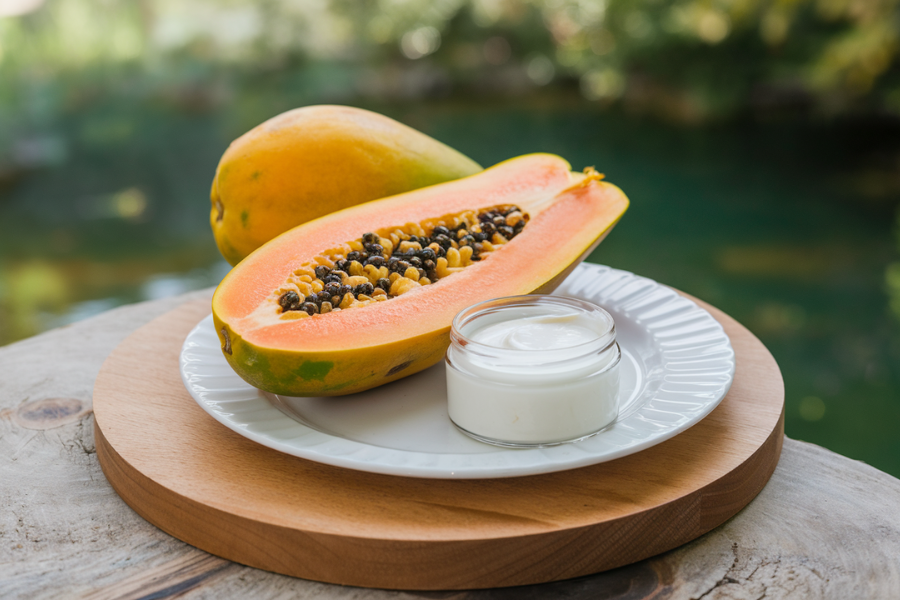In recent years, natural cosmetics have gained tremendous popularity, particularly in countries like Bolivia, where the richness of biodiversity offers a wide range of organic ingredients that have been used for centuries in traditional medicine. Among these ingredients, aguaje (Mauritia flexuosa), also known as “fruit of the princess” or “copaiba,” stands out for its nutritional properties and skin benefits. This article dives into aguaje moisturizing cream, its relevance in Bolivia, and how research and academic theses have contributed to its development and understanding.
What is Aguaje, and Why is It Important?
Aguaje is a tropical fruit native to the Amazon region, with its distribution covering countries like Bolivia, Brazil, Peru, and Colombia. The pulp of aguaje is rich in vitamins A and C, antioxidants, and essential fatty acids, making it a standout ingredient in skincare. In Bolivia, aguaje is primarily cultivated in the country’s tropical and Amazonian zones, where its production is increasing due to growing demand both in food and cosmetic products.
One of the main features that have made aguaje so important in cosmetics is its ability to hydrate and nourish the skin. The oil extracted from the aguaje pulp is particularly rich in beta-carotene, which is essential for skin health. It helps restore elasticity and smoothness while preventing premature aging.
Aguaje Moisturizing Cream: Benefits and Uses
The growing demand for natural skincare products has made aguaje moisturizing cream a valuable player in the Bolivian market. Due to the impressive antioxidant properties of aguaje, moisturizing creams made from its pulp have become increasingly popular in the treatment of various skin conditions, such as dryness, irritation, and premature aging.
1. Deep Hydration
Aguaje cream provides intense moisture, which is especially beneficial for individuals with dry or dehydrated skin. The oil extracted from aguaje fruit deeply nourishes the skin, locking in moisture and preventing water loss. This makes it an excellent solution for skin hydration in both warm and cold climates, which is particularly important in Bolivia’s diverse climate zones.
2. Anti-aging Properties
The high vitamin C content in aguaje fruit plays a significant role in boosting collagen production, which is vital for maintaining skin’s firmness and elasticity. This makes aguaje moisturizing cream a powerful anti-aging treatment, helping to reduce the appearance of wrinkles, fine lines, and sagging skin.
3. Antioxidant Benefits
Aguaje is packed with antioxidants, including vitamin A (in the form of beta-carotene) and vitamin C. These antioxidants help protect the skin from the damaging effects of free radicals, which can contribute to skin aging and other skin concerns such as dark spots or uneven skin tone. By using aguaje cream, individuals can help their skin repair and regenerate, resulting in a healthier complexion.
4. Soothing and Calming Effects
For those with sensitive or irritated skin, aguaje moisturizing cream offers a calming effect. The natural oils and compounds in aguaje can reduce inflammation, making it an ideal choice for people with conditions like eczema, psoriasis, or rosacea. Regular use of the cream can soothe the skin and alleviate redness and irritation.
The Role of Aguaje in Bolivia’s Cosmetic Industry
Bolivia’s natural resources play a significant role in shaping its local economy, and the growing interest in sustainable products is driving the development of eco-friendly cosmetic solutions. Aguaje is a key ingredient that offers economic potential, particularly in rural areas where the fruit is harvested.
1. Sustainable Harvesting
The harvesting of aguaje fruit is a sustainable practice in Bolivia, as it does not require large-scale deforestation. The aguaje palm thrives in the Amazon Rainforest, where it can be harvested without causing harm to the surrounding ecosystem. This contributes to the preservation of local biodiversity and promotes sustainable agricultural practices.
2. Supporting Local Communities
The commercialization of aguaje has led to the creation of jobs and the development of local communities. Indigenous groups and rural workers involved in the harvesting and processing of aguaje benefit from the growing market for aguaje-based products. This has helped empower local economies and support social development projects.
Academic Research on Aguaje Moisturizing Cream
Research into the benefits of aguaje for skincare has been an important focus of academic studies in Bolivia, especially for those looking to explore how natural ingredients can be used to improve skincare products. Several theses and research papers have highlighted the potential of aguaje as an active ingredient in cosmetics.
1. Nutritional and Medicinal Properties
Studies have shown that aguaje contains high amounts of vitamins A and C, both of which are essential for skin health. These nutrients help to regenerate skin cells, enhance collagen production, and protect against environmental damage. Research has also pointed to the anti-inflammatory properties of aguaje, which makes it an ideal ingredient for soothing the skin.
2. Cosmetic Applications
Many theses have examined the cosmetic applications of aguaje oil and cream, particularly in the context of its role in moisturizing and anti-aging skincare products. Research has demonstrated that aguaje-based products, such as moisturizers, are effective at improving skin hydration and elasticity. These findings have helped bolster the development of locally made skincare brands, which focus on the use of natural and sustainable ingredients.
3. Potential for Export
In addition to its popularity in local markets, aguaje has the potential to become a significant export product for Bolivia. With growing international demand for natural, organic skincare, Bolivian aguaje products could find a place in global markets, promoting both the country’s biodiversity and its sustainable farming practices.
The Future of Crema Hidratante De Aguaje En Bolivia Tesis
The future of Crema Hidratante De Aguaje En Bolivia Tesis looks promising, with ongoing research and development focused on optimizing the benefits of this unique fruit. As consumer demand for natural and eco-friendly products continues to rise, there are significant opportunities for Bolivian companies to lead the way in the production of high-quality skincare products made from aguaje.
1. Innovation in Product Development
There is room for innovation in the formulation of aguaje-based products. Future research could lead to the development of creams, serums, and oils that incorporate other complementary ingredients, such as Andean herbs, to enhance the benefits of aguaje. Additionally, improvements in extraction techniques could ensure that the highest-quality ingredients are used in the formulation of skincare products.
2. Global Recognition
As awareness of the benefits of natural skincare continues to grow globally, there is a strong potential for aguaje moisturizing creams to gain recognition outside of Bolivia. International consumers are increasingly interested in sustainable and ethically sourced products, and the rich biodiversity of Bolivia provides an opportunity to cater to this demand.
3. Promotion of Sustainable Practices
The continued growth of the aguaje industry in Bolivia could serve as a model for other countries seeking to leverage their natural resources for economic growth while preserving environmental sustainability. By supporting sustainable farming practices and encouraging the use of eco-friendly packaging, Bolivian companies can position themselves as leaders in the global natural cosmetics market.
Conclusion
The increasing popularity of aguaje moisturizing cream in Bolivia reflects the rising demand for natural and sustainable skincare solutions. With its rich composition of vitamins A and C, antioxidants, and essential fatty acids, aguaje provides deep hydration, anti-aging benefits, and soothing effects for sensitive skin. Bolivia’s cosmetic industry is embracing this powerful ingredient, promoting sustainable harvesting and supporting local communities. Academic research continues to validate its effectiveness, paving the way for innovation and potential global recognition. As Bolivia strengthens its presence in the natural cosmetics market, aguaje-based skincare products are poised to become a symbol of sustainable beauty.
FAQs
1. What are the main benefits of aguaje moisturizing cream?
Aguaje moisturizing cream provides deep hydration, anti-aging effects, antioxidant protection, and soothing relief for sensitive or irritated skin.
2. Is aguaje cream suitable for all skin types?
Yes, its natural formulation makes it ideal for dry, combination, and sensitive skin. It is especially beneficial for mature skin due to its high vitamin C and antioxidant content.
3. How should aguaje moisturizing cream be applied?
It is best applied to clean skin, gently massaging until fully absorbed. It can be used both in the morning and at night as part of a skincare routine.
4. Is aguaje production in Bolivia sustainable?
Yes, the harvesting and cultivation of aguaje in Bolivia follow sustainable practices, protecting ecosystems, supporting local economies, and benefiting rural communities.
5. Are there scientific studies on the effectiveness of aguaje in cosmetics?
Yes, various research studies and academic theses have examined the benefits of aguaje for skincare, highlighting its ability to improve hydration, elasticity, and its potential for export.
6. Where can I buy aguaje moisturizing cream in Bolivia?
It is available in natural cosmetic stores, eco-friendly markets, and online platforms specializing in organic and sustainable products.





